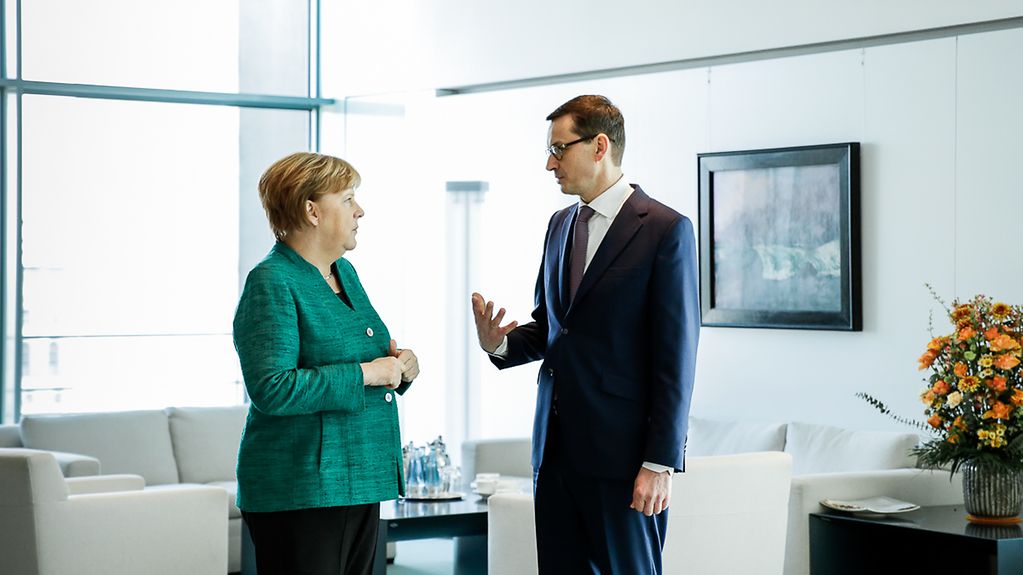Poland's Prime Minister in Berlin
In the fields of economic and defence policy, Germany and Poland intend to cooperate closely. The two countries also intend to work together to address the root causes of displacement, stressed the Chancellor, when the Polish Prime Minister visited Berlin.
4 min reading time

Germany and Poland intend to work together to address common challenges
Photo: Bundesregierung/Denzel
In a statement following talks with the Polish Prime Minister Mateusz Morawiecki, Chancellor Angela Merkel stressed the importance of German-Polish relations. They are, she said, "extremely close and intensive" both in the border regions and in economic terms.
All in all, she said, it was a "very reasonable, very good meeting marked by the will to develop our relations as well as possible, because this is in the best interests of both sides". For these reasons, the intensive dialogue will be continued, also in the form of government consultations as soon as Germany has a new government.
Economies closely interconnected
"Our economies are closely interconnected, and the volume of trade is extremely dynamic," said Angela Merkel. It is important that there is broad-based cooperation among medium-sized companies. To this end, the governments should work to improve conditions.
Competitiveness should be strengthened, especially within the European Union, and every aspect of the Single Market should be well developed. In terms of the freedom to provide services, Germany expects a certain standard, "but Germany obviously upholds the freedom to provide services overall," assured the Chancellor.
Differences persist regarding the Nord Stream 2 pipeline project. "We believe that this is a business project. We are in favour of diversifying energy sources. We also want Ukraine to retain its role as a transit country for gas supplies," stressed Angela Merkel. There is no risk to diversification and the German side believes "that this should be seen from an economic stance," she said.
Vibrant cooperation in the awareness of historical events
What is particularly close to her heart, said Angela Merkel, is that the close dialogue between civil society in the two countries continues and that the instruments of German-Polish cooperation are used. It is especially important to ensure that young people from Germany can continue to visit the memorial sites in Kreisau (Krzyżowa) and Auschwitz, "so that they can see and hear the true answers through history".
Germany "naturally absolutely accepts its responsibility for the Holocaust and its historical responsibility," said the Chancellor clearly. This is why Germany would like to see more youth encounters and exchanges. It would also be desirable to revive the Weimar Triangle with France.
In her podcast before the Polish Prime Minister’s visit, the Chancellor stressed how positively relations between the two countries have developed since they signed the Treaty of Good Neighbourliness, Friendship and Cooperation, 27 years ago. Even if "there are perhaps differences of opinion on some questions" she said, vibrant cooperation between the civil societies in both countries is particularly important.
In view of what happened under the National Socialists, declared Angela Merkel, she as German Chancellor believes it is important to say quite clearly, "We Germans are responsible for the things that happened during the Holocaust, or Shoah, under the National Socialists." There were concentration camps, for which Germany was responsible, "and this responsibility continues. And every German government will accept this responsibility," declared Angela Merkel.
Stepping up talks
People with Polish roots are "of course welcome" in Germany, and, in cooperation with the individual federal states, are also to be given the opportunity to learn Polish. Conversely, it would also be desirable for the Round Table for the concerns of the German minority in Poland, which has not met for three years now, to be revived, she said. The two ministries of foreign affairs are to work closely and intensively on this point.
Shared foreign and security policy interests
With a view to the situation in Ukraine, the Chancellor and her Polish visitor declared that they support the Normandy format as a way of implementing the Minsk agreements. The focus is on retaining the sovereignty and territorial integrity of Ukraine. To this end, Germany and Poland are in contact with both the Russian and the Ukrainian leadership.
In the field of refugee policy, Angela Merkel sees common ground "wherever efforts to address the root causes of displacement play a role". Germany and Poland run schools in Lebanon in order to help refugees there. And the two countries believe that the EU’s external borders must be better protected by the EU’s Frontex border management agency in Warsaw. "We believe that the future financial framework must ensure that these new duties can in fact be performed," stipulated the Chancellor.
Cooperation in the defence sector too is important, she said, especially with respect to the European component of NATO (North Atlantic Treaty Organization). The Permanent Structured Cooperation (PESCO) marks important progress in this context for dealing with European tasks.
EU monitors treaty compliance
With a view to the disagreement between the European Union and Poland regarding the reform of Poland’s judiciary, the Chancellor declared her conviction that the talks between the Polish Prime Minister and the European Commission will be successful. "When we joined the European Union we all undertook to respect rule-of-law principles. That is, as it were, the foundation on which our cooperation within the European Union is based," explained Angela Merkel. "I hope and I believe that we are on the right path," she declared.